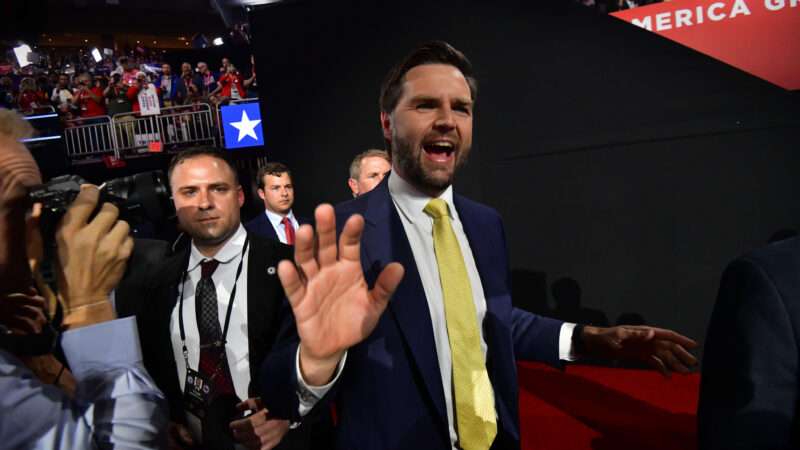
In the pages of his best-selling memoir, Hillbilly Elegy, Sen. J.D. Vance (R–Ohio) uses his life story as a model for how the children of down-on-their-luck Americans from outside the country's political and cultural power centers can find success.
It is, sincerely, a compelling personal story. One that Vance retold in vivid detail to cap the third night of the Republican National Convention (RNC) in Milwaukee. He got out of his childhood home of Middletown, Ohio—"a place that had been cast aside and forgotten by America's ruling class in Washington," he said—to join the Marines, attend college, graduate from Yale Law School, and become a husband and father.
"Some people tell me I've lived the American Dream, and, of course, they are right," said Vance, who accepted the nomination to be Donald Trump's running mate this November.
Vance is still telling his personal story, but eight years after Hillbilly Elegy was published (and Trump roared onto the political scene), the lessons of the tale have changed. Back then, he wrote, "These problems were not created by government or corporations or anyone else. We created them, and only we can fix them."
That's not the case anymore. Instead of encouraging an escape from the cycle of poverty and drug addiction that is holding back the Americans who might otherwise follow Vance's example, it's now more politically expedient for Vance to encourage those individuals to find someone to blame for their problems.
In his RNC speech, there were plenty of scapegoats. To highlight just a few:
- "NAFTA, a bad trade deal that sent countless good jobs to Mexico."
- "From Iraq to Afghanistan, from the financial crisis to the Great Recession, from open borders to stagnating wages, the people who govern this country have failed and failed again."
- "Wall Street barons crashed the economy, and American builders went out of business."
- "Thanks to these policies that [President Joe] Biden and other out-of-touch politicians in Washington gave us, our country was flooded with cheap Chinese goods, with cheap foreign labor, and in the decades to come, deadly Chinese fentanyl."
And the answer to those problems is no longer to grab the most readily available rung of the economic ladder and start climbing. It's not to join the Marines, work hard, and get good enough grades to earn a spot at Yale (and grab the corresponding ticket to the elite world that Vance now inhabits).
Now, Vance posits that the answer is to vote for Trump, naturally.
This is a pretty unsatisfying answer if your goal is to provide an actual economic and cultural lifeline to people who have been left behind. They've probably tried voting before! In fact, many of them have probably voted for Trump before—possibly twice.
This is the uncomfortable contradiction at the center of Trump's third campaign for the presidency. He's still campaigning as the ultimate populist outsider on a mission to overturn the political system and rewrite the American economic order—even though he controls one of the two major political parties and was literally the president for four years.
That contradiction is reflected in Trump's decision to put Vance on the ticket. Trump is a wealthy heir from New York City who embraced low-brow culture to become a champion of the working class. Vance is the child of the working class who embraced the political and cultural elite to get to a place that he said Wednesday he "never in my wildest imagination" believed he'd end up at.
They're both compelling stories, and Trump and Vance are an undeniably fascinating set of characters playing roles that break some of the usual archetypes in the political system. But being a fascinating character is not the same as having good ideas or workable solutions.
There will be plenty of time later in the campaign to dig into the specifics of those policies. For now, this much should be clear: Voting harder isn't going to save the people of western* Ohio, or anywhere else. Vance escaped that life and parlayed his empowering personal story of success into the chance to be one heartbeat away from the presidency. Do as he does, not as he says.
CORRECTION: This post originally misidentified the location of Middletown within Ohio.
The post J.D. Vance Turned an Inspiring Personal Story Into an Unsatisfying Political Sales Pitch appeared first on Reason.com.







